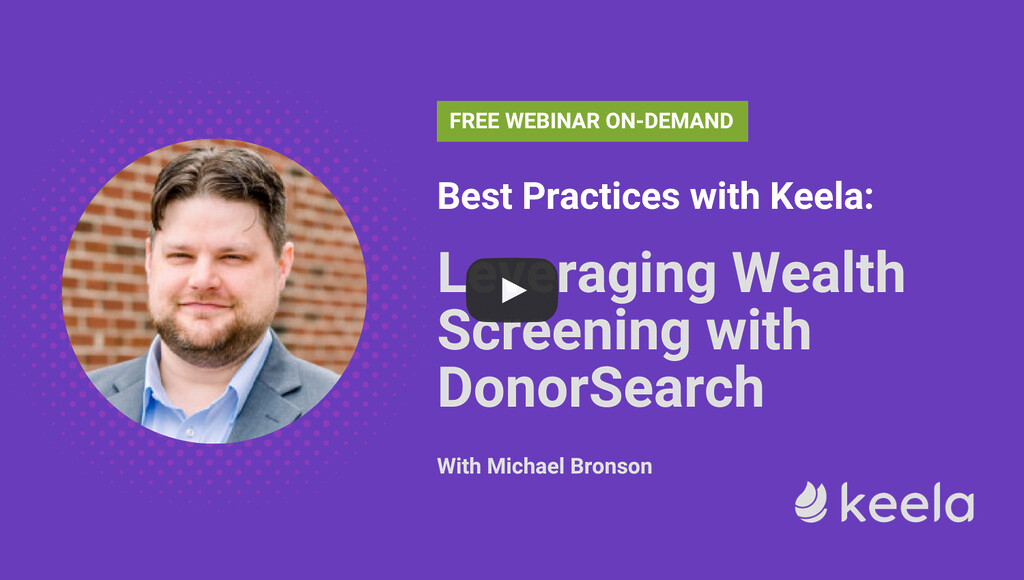Wealth Screening 101: A Comprehensive Guide for Nonprofits Looking to Boost Fundraising Results


If you’re a nonprofit organization looking to increase your fundraising efforts, then you need to pay attention to the concept of wealth screening. Wealth screening for nonprofits is a process that allows you to identify potential high-value donors based on their financial giving capacity.
By using donor wealth screening techniques, nonprofits can save time and resources by focusing their efforts on donors who have the greatest potential to make significant donations.
In this blog, we’ll dive deeper into the importance of wealth screening and explore the different methods that your nonprofit can use to effectively identify your most promising prospective donors.
What is Wealth Screening?
Wealth screening for nonprofits is the process of analyzing an individual’s financial information to determine their giving capacity and potential as a donor. This technique allows your organization to identify donors who have the ability to make significant contributions, helping you to focus your fundraising efforts more effectively.
This involves using wealth screening software to collect data points from publicly available sources to build a profile of the individual’s wealth and philanthropic interests. By using this method, you can gain valuable insights into prospective donors, and develop targeted strategies to engage and cultivate their support for your cause.
What Kinds of Data Are Analyzed in Wealth Screening?
Wealth screening for nonprofits involves analyzing the following types of data points:
Financial Information
This includes income, assets, and liabilities, which help to determine an individual’s financial capacity to donate.
Real Estate Holdings
This kind of data is analyzed to get a better understanding of an individual’s property ownership and value. In fact, individuals with over $2 million in real estate ownership are 17x more likely to give philanthropically.
Public Record Data
This includes things such as stock holdings, business ownership, charitable giving, and political contributions, which can provide insight into an individual’s philanthropic interests and giving history.
When you analyze all of this information, your nonprofit can take actionable insights to develop targeted fundraising strategies and engagement plans that appeal to a donor’s interests and financial capacity. This ultimately results in more successful fundraising efforts and stronger relationships with your key donors.
How Should Nonprofits Use Wealth Screening?
As a nonprofit, you should use wealth donor screening as a vital part of your fundraising strategies and prospect research process. Wealth screening helps you to understand a donor’s interests and capacity to give, allowing you to create custom fundraising strategies to increase revenue.
Some of these strategies could include customized communication, events, and stewardship opportunities designed to build long-term relationships with key donors. Additionally, wealth screening can help you to prioritize donors and create effective gift ask strategies that maximize donations.
Where Does Wealth Screening Data Come From?
As a nonprofit, you may wonder where the wealth screening data comes from to provide these insights. The data comes from several different sources including public records, government databases, financial filings, and other publicly available information. Some sources also use proprietary algorithms to analyze the data and provide insights into a donor’s wealth, interests, and charitable giving capacity.
Additionally, wealth data sources will partner with other organizations to gain access to additional donor data sources, such as subscription-based financial and business databases.
The Benefits of Wealth Screening for Nonprofits?
Wealth screening provides numerous benefits to nonprofits including:
Improved Donor Retention
Wealth screening can help your organization identify and engage your most valuable donors. By cultivating strong relationships with high-potential donors, you can increase donor retention rates (which currently sits around 45% in the nonprofit industry) and create a stable base of support for their organization.


Calculate your donor retention rate with this FREE Advanced Donor Retention Calculator!
With this Advanced Donor Retention Calculator, you can calculate your retention rate, identify your biggest supporters, and build fundraising strategies to ensure donors continue their support.
Better Decision Making
Wealth screening provides you with valuable data and insights that can inform your decision-making. By understanding your donor base and potential donors, you can make informed decisions about fundraising strategies, program development, and overall organizational strategy.
Increased Transparency
Wealth screening helps you to promote transparency in your fundraising efforts. By using publicly available data to identify high-potential donors, you can demonstrate to your supporters and the public that you are using your resources effectively and ethically. This can help to build trust with prospective donors, and stakeholders, and ultimately enhance your organization’s reputation.
The Limitations of Wealth Screening for Nonprofits
While wealth screening provides many benefits for nonprofits, there are also some limitations to consider as you start to incorporate it into your fundraising strategy. Some of the limitations of wealth screening are:
Incomplete data
Wealth screening relies on publicly available donor data, which may not provide a complete picture of a potential donor’s wealth or philanthropic interests. This can result in inaccuracies and limitations in the analysis, leading to missed opportunities or misjudgments in targeting high-potential donors.
Ethical Considerations
Some may view wealth screening as an invasion of privacy, especially if personal information is collected without consent. Nonprofits must be careful to use ethical and transparent practices when conducting wealth screening, and ensure that they are complying with relevant laws and regulations.
Cost
Wealth screening can be expensive, especially if it requires the use of specialized software or the hiring of outside consultants. Smaller nonprofits may not have the resources to conduct comprehensive wealth screening, putting them at a disadvantage when identifying high-potential donors.
As a nonprofit, it’s important to be aware of these limitations when using wealth screening in your fundraising efforts. While it can be a valuable tool, you should also consider other factors, such as a donor’s history of engagement and affinity with your organization, when identifying high-potential donors.
How Wealth Screening Can Help Nonprofits
As a nonprofit, there are many ways that wealth screening can help you achieve your fundraising goals and increase your impact incuding:
Identifying High-Net-Worth Individuals and Major Gift Donors
Wealth screening can help you identify high-net-worth individuals who have the financial capacity to make significant donations to your nonprofit. Wealth screening also allows you to follow prospect research best practices and use common donor prospect research tools to identify potential new major gift donors, who may have been previously overlooked, but who have the potential to make substantial contributions to your organization.
Enhancing Donor Segmentation and Personalization
Wealth research and wealth screening allows you to segment your donor base more effectively, based on their financial capacity and philanthropic interests. By segmenting your donors, you can develop tailored fundraising strategies that appeal to their interests and giving capacity. This results in a more personalized approach to donor engagement, which can help to build stronger relationships with your donors and increase their loyalty to your organization. With wealth screening, you can ensure that your communication and engagement efforts are targeted and effective, leading to increased donor satisfaction and long-term support.
Optimizing Fundraising Strategies
By using wealth screening, you can optimize your fundraising strategies and maximize your return on investment. Wealth screening helps you to identify high-potential donors, allowing you to focus your resources on those who are most likely to make significant contributions. This leads to a more efficient use of resources and can result in increased fundraising success.
Implementing Wealth Screening for Your Nonprofit
When it comes to selecting the best wealth screening tool for your nonprofit, there are several factors to consider. First and foremost, you’ll need to assess your organization’s unique needs and budget. From there, you can start researching various paid and free wealth screening tools on the market and compare their features, pricing, and customer reviews. Consider the level of customization, data accuracy, and ease of use offered by each tool.
It’s also important to make sure the tool you choose integrates well with your existing CRM or fundraising software. One of the best examples of this is Keela’s donor management and fundraising platform. Keela integrates with Donor Search to provide you with actionable and accurate information and identify your best prospective major gift donors, annual donors, planned giving donors, and increase matching gifts.
Access wealth indicators directly in your CRM with Keela!
See how you can use Keela to gain valuable wealth screening insights to help you identify potential high-value donors in your database.
How Keela and Donor Search Wealth Screening Work Together to Help You Raise More
It’s very easy to connect Donor Search and Keela and start learning more about your donors right away. By connecting the two platforms, you can gain valuable insights that will combine financial data, philanthropic data, and other factors to help you:
- Access wealth indicators and insights to better understand wealth rating without ever having to leave Keela‘s CRM
- Identify major donors (or wealthy donors) with potential, capacity, and willingness to give
- Improve your solicitation strategy by better understanding how much each donor can realistically afford
- Gain a deeper understanding of your donors with Keela’s insights
- Save time and money by using both platforms together.
Conclusion
In conclusion, wealth screening is an incredibly powerful tool that can provide your nonprofit with invaluable insights into your donors’ giving capacity, interests, and preferences. By using wealth screening, you can improve donor retention, make better-informed decisions about your fundraising strategies, and increase transparency in your organization.
With so many benefits, it’s clear that wealth screening should be a key component of your nonprofit’s fundraising arsenal. So why not take the next step and start incorporating the wealth screening process into your fundraising strategy today? Whether you’re just starting out or looking to take your fundraising efforts to the next level, implementing wealth screening can help you achieve greater success in your mission and make a positive impact in your community.
If you’re interested in learning more about Keela’s donor management and fundraising software and how it can help your organization use wealth screening effectively, feel free to book a conversation with one of our fundraising experts here.


About the author:
Meredith Gray
Head of Marketing, Keela
Meredith has always had a passion for work that makes an impact. Having spent over 7 years working in fundraising, she has gained extensive knowledge in marketing, peer-to-peer, events, and sponsorship and firmly believes that all successful fundraising strategies start with your data.
Having experienced it first-hand, she understands the challenges nonprofits face when building a fundraising strategy and loves connecting with other like-minded fundraisers to brainstorm new and creative ways to leverage data to increase revenue. When not working, Meredith can be found trying out one of Toronto’s diverse restaurants, breaking a sweat in a spin class, or researching her next travel destination.


![Navigating Nonprofit Donation Receipts: Your Essential Roadmap [+Examples]](https://www.keela.co/wp-content/uploads/nonprofitdonationreceiptrequirements-960w-300x132.png)
